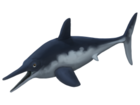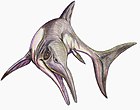Ichthyosauriformes
| Ichthyosauriformes | |
|---|---|

| |
| Chaohusaurus | |
| Scientific classification | |
| Domain: | Eukaryota |
| Kingdom: | Animalia |
| Phylum: | Chordata |
| Class: | Reptilia |
| Clade: | †Ichthyosauromorpha |
| Clade: | †Ichthyosauriformes Motani et al., 2014 |
| Subgroups[1][2] | |
The Ichthyosauriformes are a group of marine reptiles, belonging to the Ichthyosauromorpha, that lived during the Mesozoic.
The stem clade Ichthyosauriformes was in 2014 defined by Ryosuke Motani and colleagues as the group consisting of all ichthyosauromorphs that are more closely related to Ichthyosaurus communis than to Hupehsuchus nanchangensis. Their synapomorphies include the possession of a long nasal bone, stretching to the front beyond the nostril; large scleral rings, filling the eye sockets; a narrow snout in top view; and converging digits with little space between them.
The Ichthyosauriformes probably split off in the Early Triassic, about 250 million years ago; the last known forms lived in the middle Cretaceous. A basal ichthyosauriform is Cartorhynchus; more derived species are part of the Ichthyopterygia which again include the Ichthyosauria.
References
- ^ Huang, J.; Motani, R.; Jiang, D.; Tintori, A.; Rieppel, O.; Zhou, M.; Ren, X.; Zhang, R. (2019). "The new ichthyosauriform Chaohusaurus brevifemoralis (Reptilia, Ichthyosauromorpha) from Majiashan, Chaohu, Anhui Province, China". PeerJ. 7: e7561. doi:10.7717/peerj.7561. PMC 6741286. PMID 31565558.
- ^ Qiao, Yu; Liu, Jun; Wolniewicz, Andrzej S.; Iijima, Masaya; Shen, Yuefeng; Wintrich, Tanja; Li, Qiang; Sander, P. Martin (2022-11-14). "A globally distributed durophagous marine reptile clade supports the rapid recovery of pelagic ecosystems after the Permo-Triassic mass extinction". Communications Biology. 5 (1). doi:10.1038/s42003-022-04162-6. ISSN 2399-3642. PMC 9663502. PMID 36376479.
{{cite journal}}: CS1 maint: PMC format (link)
Literature
- Motani, R., Jiang, D.-Y., Chen, G.-B., Tintori, A., Rieppel, O., Ji, C., and Huang J.-D., 2014, "A basal ichthyosauriform with a short snout from the Lower Triassic of China", Nature. doi:10.1038/nature13866








